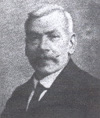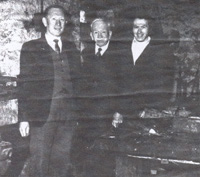John A Weir & Sons Est. 1867
Banbridge Co. Down
Agricultural & Garden Machinery, Wrought Iron Gates & Railings
Company History
 In 1867 a young man named William Weir who originated from Drumlee purchased property, set up home and commenced a business known as 'William Weir, Ballyroney Foundry' at Tlerkelly Hill Road, Ballyroney.
In 1867 a young man named William Weir who originated from Drumlee purchased property, set up home and commenced a business known as 'William Weir, Ballyroney Foundry' at Tlerkelly Hill Road, Ballyroney.His many varied tasks in the early days included sharpening picks, shafting shovels and moulding cast iron. The business grew and so did his workforce and at a stage he had 22 men in his employment.
Amongst his employees were carpenters, moulders, blacksmiths, strikers, fitters and painters. These men were put to work in the making of threshing machines, carts, drills ploughs, swing ploughs, spring harrows, all horse drawn implements and wrought iron gates.
In those days a plough cost approximately £3:10s and a horse drawn cart was in and around £6:10s, Old ledgers reveal that the amount charged for many of the different tasks undertaken at the Foundry was in the region of 3d.
In 1876 William married Miss Agnes Truesdale and they had five sons and two daughters.
Four of his sons worked in the business for a time and then three set up businesses of their own leaving the youngest son John to work alongside his father William at Tierkelly Hill.
William Weir died in 1915 and his son John, who was now aged 21, took over the business and later changed the name to 'John A Weir & Son'.
The construction of the railway at Ballyroney generated a lot of work and the business grew from strength to strength. A crane from Ballyroney Station was purchased and erected and this was used to aid the lifting of the heavy implements on to the carts and trailers. This crane, although not now in use, still stands tall in the yard.
John and his employees continued to make harrows, carts and ploughs and he was very proud of the fact that two of his ploughs were exported to America.
He also sold stationary engines that had been used during the height of the manufacturing of the threshing machine and indeed some of these stationary engines are scattered about the countryside to this day.
As the horse was kept busy on the farm pulling farm implements and carts so too was the foundry busy making and fitting horse shoes.
The tractor age led to the making of tractor implements and this generated a lot of work. In the early 1940s they also began to sell petrol. A gallon of petrol would then have cost approximately 1s:3d as opposed to approximately £4 today.
Tractors were improving rapidly and tractor implements were then manufactured by larger firms and John A Weir & Son decided to become agents for the various up and coming manufacturers and carried a stock of the latest ploughs, drills, harrows etc and their spare parts.
 Three generations of the Weir family:
Three generations of the Weir family:Jack, John and Malcolm.
John died in 1992 aged 99 and his son Jack and grandson Malcolm continued to run the business.
Today John A E Weir, great great grandson of the founder is in charge and continues to sell agricultural machinery and garden machinery.
He has followed in his great great grandfather's footsteps in the manufacturing of gates and a gate made in 1884 by William Weir is on display at the Tierkelly Hill premises.
Today gates and matching railings are in big demand and John thrives on doing the work that his great great grandfather William commenced back in 1867.
Copyright 2026 John Weir & Sons
Site By MMC Solutions